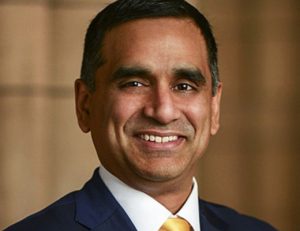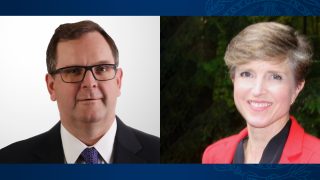Starting in April, Sastry will lead the university’s central financial functions, including accounting and financial reporting, budgeting and planning, procurement, and treasury services. Sastry will work under the Office of the Senior Vice President and Chief Operating Officer led by David Green. 
“My decision was driven by many factors. I have always appreciated the University’s commitment to educational excellence and its influence locally, nationally and globally. And this is an incredible opportunity to contribute to the University’s exciting plans to grow and expand,” Sastry said.
Sastry will be no stranger to Georgetown and the wider Washington, DC, area as he is a proud Hoya who earned his master’s degree in public policy from the McCourt School of Public Policy, then known as the Georgetown Public Policy Institute. He says he’s eager to return to his alma mater and serve the Georgetown community in his new role.
“We are thrilled to welcome Hari to Georgetown and look forward to his leadership as he guides the university’s financial services and strategies in support of our mission,” said Georgetown President John J. DeGioia.
Since 2018, Sastry has served as the senior vice chancellor and chief financial officer at the University of Pittsburgh, where he oversees the institution’s financial resources, including general, student, cost and research accounting, budget and financial reporting, treasury responsibilities, payroll, risk management, tax matters and investments. In his role, Sastry leads a team of approximately 200 people and administers the university’s $3 billion budget and $5.5 billion endowment.
Prior to his career in higher education, Sastry spent 18 years working in the federal government. He served as the director of the Office of U.S. Foreign Assistance Resources at the Department of State, managing the $37 billion foreign assistance budget for the State Department and the United States Agency for International Development. Sastry also worked in the U.S. Department of Commerce and the White House Office of Management and Budget, where he managed budget and policy matters related to health care systems.
A Chicago native, Sastry spent much of his upbringing in the Midwest, earning his bachelor’s degree in mathematics from the University of Michigan and a master’s in public health from the University of Illinois at Chicago.
“It really feels like a coming home for me — both in terms of returning to the institution of Georgetown and to the city of Washington, DC. I’m excited for this great opportunity,” Sastry said.
Get to Know Hari Sastry
What about working at Georgetown are you excited about?
Primarily, I am excited about meeting new people. I believe that who you collaborate with significantly influences your work experience, making the camaraderie within a team essential. I am eager to integrate into the Georgetown community in a different way than as an alum.
What are you hoping to accomplish at Georgetown?
I want to understand the goals of the University and leverage the strengths of the CFO organization to help move the university towards those goals. I want the CFO to be viewed as a partner by the entire university community in achieving its objectives.

